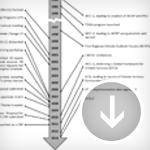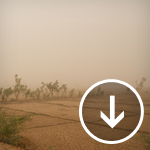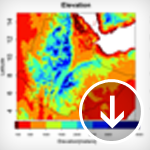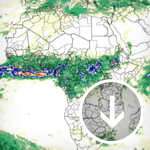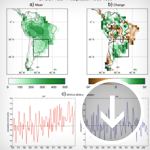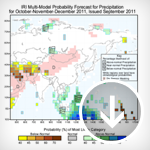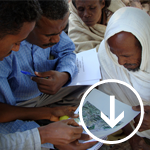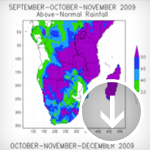Special Issue: Shaping the Landscape of Climate Services
“A climate-informed and climate-ready world is possible. Large investments are being made toward adaptation and resilience to climate change, but many of those investments are separated from the more immediate climate-related vulnerabilities and opportunities that society faces. Information is increasingly available that could be used to guide action; however, information alone is not sufficient.”
-Lisa Goddard, Walter Baethgen, Haresh Bhojwani and Andrew Robertson.
The above paragraph kicks off a special issue of the journal Earth Perspectives, dedicated entirely to the work and mission of the International Research Institute for Climate and Society.
Shaping the Landscape of Climate Services: The International Research Institute for Climate and Society contains 14 essays and articles that together describe and illustrate how the institution has worked since 1996 to develop credible climate information and to make that information useful to those who could benefit from it. They tell a story of substantial advances in the incorporation of climate science for the betterment of society.
As the papers make clear, a strong foundation in science has underpinned IRI’s three-pronged approach to climate services: conduct strategic research, develop relevant products and tools, and provide training and capacity building that enable more informed use of this knowledge.
The demand for climate information has grown exponentially since IRI’s founding and early successes, and as a result, today there are more institutions and programs focused on various aspects of climate modeling, monitoring and information production.
“The IRI itself continues to be among the leaders in this innovative field and continues to be sought after by development organizations, public health networks, countries and sector specific-associations as a well-respected source of technical knowledge and expertise,” writes a team from the National Oceanic and Atmospheric Administration’s Climate Program Office and the U.S. Agency for International Development’s Global Climate Change Office. IRI was established as a cooperative agreement between NOAA’s Climate Program Office and Columbia University. USAID began directly funding some of IRI’s projects in 2010.
Below is a summary of the 14 papers. In the coming weeks, we’ll be posting highlights from each of these papers, along with exclusive interviews, multimedia and graphics.
Overview
The International Research Institute for Climate & Society: Why, What and How.
IRI’s management team introduces the mission and evolution of the IRI and give examples of how the institution’s work to date has influenced changes in the landscape of climate information development and service delivery.
Examples of IRI’s Work and Engagement
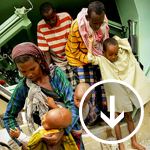
Climate Information for Humanitarian Agencies: Some Basic Principles
IRI’s ongoing partnership with the International Federation of Red Cross and Red Crescent Societies and the Red Cross Red Crescent Climate Centre has led to real advances in applying climate services in the context of humanitarian decision making.
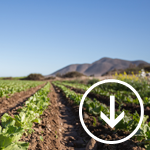
Climate Risk Management for Water in Semi–arid Regions
How seasonal climate forecasting can be an integral central part of drought early warning and for water allocation decision-support systems in semi-arid areas such as Chile’s Coquimbo region.
Shaping Global Agendas on Climate Risk Management and Climate Services: An IRI perspective
IRI helped shape the development of the Climate Services Partnership and the CGIAR research program on Climate Change, Agriculture and Food Security (CCAFS), which was structured to include a theme on “Adaptation through Managing Climate Risk,”–putting climate risk management on the same footing as adaptation to future climate change.
Meningitis and Climate: From Science to Practice
Ongoing work toward the development of early warning and monitoring of epidemic meningitis with cooperation among diverse research and practice communities provides a model for how climate services for health might develop over time.
Bridging Critical Gaps in Climate Services and Applications in Africa
A creative solution to bridge the gaps in the availability, access and use of national climate information through the Enhancing National Climate Services (ENACTS) initiative, which started in Ethiopia, a country particularly prone to climate related risks.
Climate and Environmental Monitoring for Decision Making
IRI’s robust monitoring tools and early warning systems for forecasting and managing desert locust swarms in Africa and forest fires in Indonesia and Latin America, and how we’ve linked them into decision making and policies.
Climate and Health in Africa
IRI and partners have worked to develop climate services for the health sector in Africa by integrating research, operational applications and capacity building alongside policy development and advocacy. IRI’s role as a knowledge broker in research and professional capacity building, facilitation of communities of practice, and engagement in policy dialogue at local and global scale has been critical to delivery of its mission.
The Role of Targeted Climate Research at the IRI
Four examples of targeted climate research that cover a range of time scales, from sub-seasonal variability to long-term climate trends in the Sahel, southeastern South America, the Philippines and Indonesia. While many institutions are engaged in basic climate research, having the expertise and capacity to do so within the IRI provides it with the necessary flexibility to target its work towards specific climate-related questions around the world.
How We Do What We Do
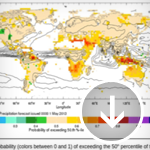
IRI Data Library: Enhancing Accessibility of Climate Knowledge
The IRI Data Library is a key platform that makes climate and other data products more widely accessible through tool development, data organization and transformation, and data/technology transfer.
Climate Information, Outlooks, and Understanding– Where Does the IRI Stand?
Most users of climate information are not climate scientists, so the manner in which the information is provided is of paramount importance in order for it to be understandable and actionable. A description of IRI’s main climate products, with examples and explanations of their utility.
Capacity Development Through the Sharing of Climate Information with Diverse User Communities
Over the last decade IRI has transitioned from an institution that focuses on capacity building to one that focuses on capacity development. Rather than simply providing climate information and teaching users how to use it, we now work with them to address their specific needs and work to build a knowledge partnership that benefits both parties. Four examples illustrate this process.
Articles from Research and Funding Partners
How the International Research Institute for Climate and Society has Contributed Towards Seasonal Climate Forecast Modelling and Operations in South Africa
IRI’s Climate Predictability Tool is considered to be of such importance for seasonal forecasting in South Africa that the country’s National Research Foundation partly supports its development.
US Investments in International Climate Research and Applications: Reflections on Contributions to Interdisciplinary Climate Science and Services, Development, and Adaptation.
Reflecting on the initial vision for and evolution of the IRI, the importance of investments in endeavors of this nature to the US climate research and services communities, and the value of such an institution to USAID, a federal entity concerned with development and risk management in developing countries.
About the IRI:
The International Research Institute for Climate and Society (IRI) is a unique organization that has been at the forefront of innovation in producing and using climate data. In the less than 20 years since its founding, IRI has utilized climate science to help anticipate and manage climate risks and opportunities, particularly in developing countries. IRI’s numerous projects include water management in the Southern Cone of South America, fire early-warning systems in Indonesia, and drought pattern research in the Sahel region. IRI’s research has shown to be valuable for countries preparing for the challenges of variable and extreme climate compounded with a growing population.


